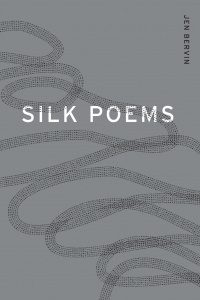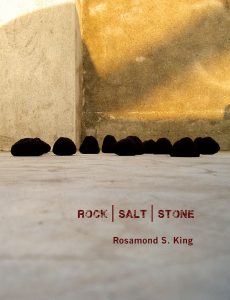Rosamond S. King & Jen Bervin: On Poetry, Art, & Our Dystopian Reality

Author: Jen Bervin
May 31, 2018
I am a huge fan of Rosamond S. King’s debut Rock | Salt | Stone, (Nightboat Books, 2017), recently nominated for a 2018 Lambda Literary Poetry Award. A creative and critical writer, performer, and artist, King has performed her politically engaged work in a dozen countries, holds a Ph.D. in Comparative Literature with a minor in Performance Studies from New York University and is an Associate Professor in the English Department at Brooklyn College. Her scholarly book, Island Bodies: Transgressive Sexualities in the Caribbean Imagination won the 2015 Lewis Award for Best Caribbean Studies Book from The Caribbean Studies Association.
Jen Bervin: Your title Rock | Salt | Stone could be read as nouns or verbs. Can you elaborate on the cover art—an installation view from your 2010 performance in Rajasthan, India—the materials we see, and how these are interconnected with the book?
Rosamond S. King: Thanks for noticing that my art is on the cover! I had sent Stephen Motika (the publisher of Nightboat Books) many images by other people that he politely declined, before remembering that I had made something myself that might work. I sent it to him without telling him it was my art, so I was doubly pleased when he was as excited as I was to make it the cover!
In Eros, I used an element that is distinctly female and connected to the erotic in India, henna, and created mounds that gesture towards natural and/or erotic shapes without being specific. I wanted to make work in Rajasthan that drew on local materials and my experience there. It works well as the cover for Rock | Salt | Stone because the mounds could refer to any of those three words.
In poetry, performance, and visual art, I am always trying to illuminate the lives and experiences of people “other” than white people and men, the traditional subjects of mainstream poetry and art. Much of my poetry collection relates to people who might be stoned in their communities, and much of it relates to how people “salt” their own life with the pleasurable flavors of desire and humor.
Jen Bervin: So essential and necessary.
Rosamond S. King: I’d also like to hear how for you visual art and poetry intersect. Nets, a collection of erasures of Shakespeare’s sonnets, was the first book of yours that I read, and it remains breathtaking, in part because of the visual element. Your latest collection, Silk Poems, also nominated for a 2018 Lambda Poetry Award, is part of a larger project that includes video and images. Are writing and art-making part of a single practice for you, or two strands of work that sometimes overlap?
Jen Bervin: I’d say my work as a whole is trying to make connections between things often seen as separate—the intratextual, text and textiles, art and science. You’ve written, “With all of my work, my goal is to make people feel, wonder, and think, in that order.” Can you elaborate on that statement, and how you hope your work will affect your audiences? How does that balance shift in the three fields you work in?
Rosamond S. King: That statement describes how I hope my work will impact individuals who experience it. When we are emotionally moved, we know that feeling has truth beyond logic. When we wonder, we become aware of different experiences and possibilities. And when we think, we can make plans that include different perspectives and that can make the possible reality. I hope that people go through all three experiences with all of my work. Because it uses words, for many people poetry will provide a clearer link to the practical, since words are tools we usually use to plan for change.
Do you have goals for what people will take away from Silk Poems when they read the book or view the art?
Jen Bervin: Two of the themes of Silk Poems are empathy and transformation—I’m trying to bring something more deeply human (and silkworm) to bear in the form of a biomedical sensor—to change our conception of how we might monitor our health, make it less lonely, more interconnected. I wrote the poem to act as a kind of talisman—it’s a love poem, a poem to keep company, to hold space.
 Your work does that in a deep way—it holds space. It holds place too—The Gambia, Trinidad and Tobago, and Brooklyn, New York. It heals, haunts, remembers, names, sings, queers, challenges, curses, protests, laughs. I fear you’ve done it all in one book! What does a writer do after a book like yours!? What are you working on now? How does being madly in love change things?
Your work does that in a deep way—it holds space. It holds place too—The Gambia, Trinidad and Tobago, and Brooklyn, New York. It heals, haunts, remembers, names, sings, queers, challenges, curses, protests, laughs. I fear you’ve done it all in one book! What does a writer do after a book like yours!? What are you working on now? How does being madly in love change things?
Rosamond S. King: …And this is the danger of doing an interview with someone who knows you fairly well! I am often madly in love, though usually with one of the places you’ve mentioned. Being in love has enabled me to see what many people think of that love, and that the person I love is not worthy of being treated like other human beings, white or het[erosexual] human beings. I knew this, of course, and knew it in relationship to myself. But I feel a profound shock and outrage that people with power over our bodies, our health, our financial well-being, cannot see beauty in my beloved or our relationship. This connects to poetry because I’ve been writing a new series, “Living in the Abattoir,” a collection of poems in which people of color live in a world-within-a-world, an abattoir (slaughterhouse) in which they are both workers and meat. In this moment, the poems about rage come too easily; I have to work harder to write the poems reminding that even in the abattoir, people laugh and dance and fall madly in love. Both of us are, in some way, writing towards more and deeper connections between people.
You have more experience, both with love and with poetry, than I do – what are you “holding space” for now? And how, in your recently nomadic life, are you able to continue holding space for making new work, maintaining an art practice, a relationship, a healthy life filled with laughter and pie?
Jen Bervin: Well, I’ll hold that thought! I desperately need time and space for all of the above. Your description of “Living in the Abattoir” makes me think of Octavia Butler’s Parable of the Sower. Reading has been my saving grace lately, and making studio visits—to Jina Valentine, Dianna Frid, Sonya Clark, Julia Fish, Anne Wilson, and Heather Watkins. I’m so thankful to have the deeper sustaining connections your works make in my consciousness.
I’ve been rereading the poet Paul Celan’s Collected Prose—something I do every year, but it feels especially relevant. Celan writes about the realities at stake in a poem, about the “thousand darknesses of murderous speech” transforming the nature of language itself. It could more aptly be retranslated “thousand whitenesses of murderous speech”. Celan writes that language is the one thing secure amid the losses, precisely because it registers them. I’m struggling with that—every word that comes out of Trump’s mouth makes me want to excise it from my vocabulary.
 Your poetic language in Rock | Salt | Stone feels like a robust register—radically innovative and deeply situated in contemporary and historical experiences of African, Caribbean, and American people. How is your own language transforming, charting, and moving through this time? In closing, can you leave Lambda’s readers with some lines from your new series “Living in the Abattoir”?
Your poetic language in Rock | Salt | Stone feels like a robust register—radically innovative and deeply situated in contemporary and historical experiences of African, Caribbean, and American people. How is your own language transforming, charting, and moving through this time? In closing, can you leave Lambda’s readers with some lines from your new series “Living in the Abattoir”?
Rosamond S. King: Singer/songwriter Toshi Reagon is making an opera out of Parable of the Sower! It does seem that we are living in some unreal dystopian fiction – did you know that Butler’s novel Parable of the Talents includes a scary presidential candidate whose slogan is “Make America Great Again?!?!”
I just got back from Split this Rock, and that festival of “socially engaged poets” was a breath of fresh language and energy. And it was a reminder that you and I, and people who think like us, are not at all alone. We need reflections of our dystopia, and also reminders of what else the world can be. If truth is stranger than fiction, then poetry is more true than what passes for truth these days!
The “Abattoir” poems are an attempt to fiercely lay claim to language rather than excise it, something I hope you will do, since I and the world continue to need your words! Here is an untitled poem from the series that, I hope, also does this:
When I
want to define and embrace
myself, when I concede that this
is a choice, I am traveling back
to the center of myself. And, yes
I am lovely and terrifying.



